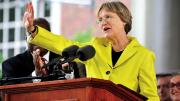Universities serve as society’s critics and conscience. We are meant to be producers not just of knowledge but of doubt—of understanding rooted in skepticism and constant questioning, not in the unchallenged sway of accepted wisdom. More than perhaps any other institution in our society, universities are about the long view and about the critical perspectives that derive from not being owned exclusively by the present.
For nearly four centuries now, Harvard has looked beyond the immediately useful, relevant, and comfortable to cast current assumptions into the crucible of other places and other times. Universities are so often judged by their measurable utility—by their contributions to economic growth and competitiveness. We can make a powerful case with such arguments.…But such contributions are only a part of what universities do and mean. We need universities for much less immediate and instrumental ends.
I worry that we as universities have not done all we could and should to ask the deep and unsettling questions necessary to the integrity of any society. As the world indulged in a bubble of false prosperity and materialism, should we—in our research, teaching, and writing—have done more to expose the patterns of risk and denial inherent in widespread economic and financial choices? Should our values have posed a firmer counterweight and challenge to excess and irresponsibility, to short-term thinking with long-term consequences?
The privilege of academic freedom carries the obligation to speak the truth even when it is difficult or unpopular. So in the end, it comes back to veritas—the commitment to use knowledge and research to penetrate delusion, cant, prejudice, self-interest. That truth may come in the form of scientific insights freed from ideology and politics. It may come in the interpretive work of humanists who show us how to read and think critically and offer us the perspective of other places, other tongues, and other times. It may come through the uniquely revisionary force of the arts—which enable us to understand ourselves and the world through changed eyes and ears. It may come through placing questions of ethics and responsibility at the core of our professional school programs.…
The enhancement of our role as critics and doubters must come as well through the education of our undergraduates, where we seek, in the words of the new General Education program, “to unsettle presumptions, to defamiliarize the familiar…to disorient young people and to help them to find ways to reorient themselves.” As we adapt to a rapidly changing world, we must build anew on Harvard’s long traditions of liberal-arts education and of humanistic inquiry. These traditions can generate both the self-scrutiny and self-understanding that lead through doubt to wisdom.
Universities as engines of opportunity; universities as the principal sites of America’s scientific research; universities as truth tellers: these are three fundamental aspects of our understanding of ourselves. Yet each faces challenges in the new era that lies ahead of us—challenges of structures, of affordability, and of values. And we are challenged in turn to demonstrate our commitment to these principles, which have so long been at the heart of how we have defined ourselves. We must not take these principles for granted, and we must not lose sight of them as we make the many choices about what to keep and what to forgo in the months ahead. But we must devise new ways of sustaining them for changed times. We are accountable to and for these traditions and the values they represent—the belief that the open and unfettered pursuit of truth will build a better world for us all. This is what inspires all that we do and all that we are—for now and in the years to come.






